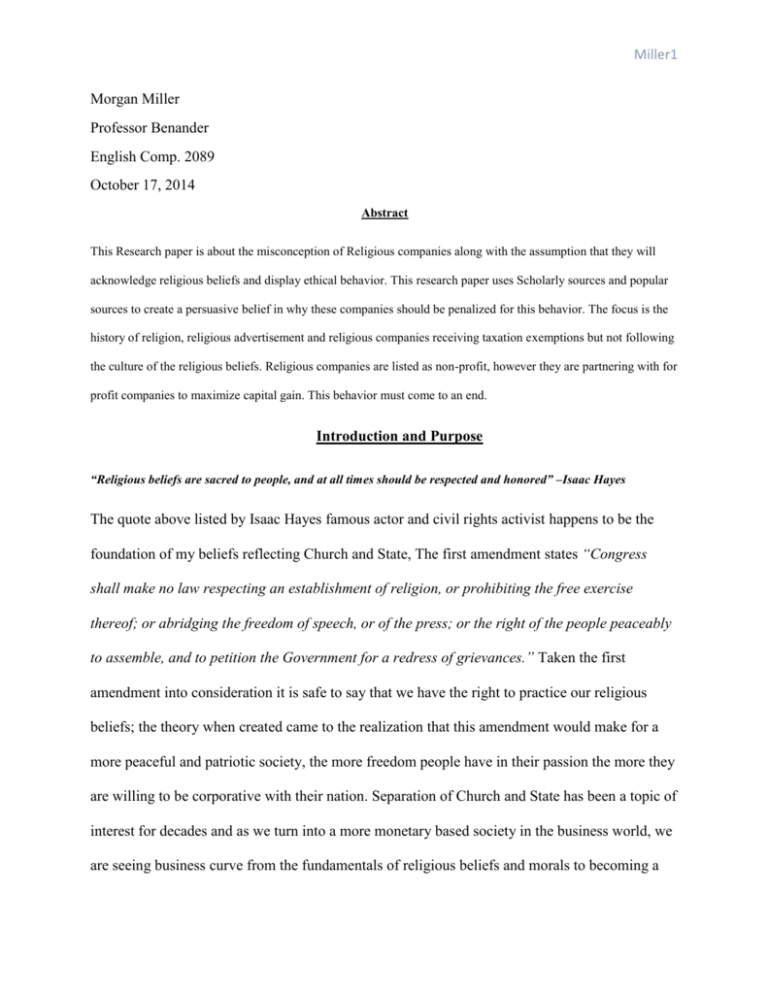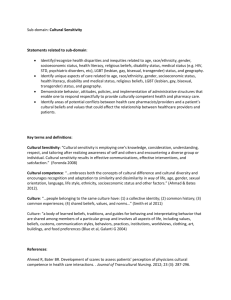Miller Morgan Miller Professor Benander English Comp. 2089
advertisement

Miller1 Morgan Miller Professor Benander English Comp. 2089 October 17, 2014 Abstract This Research paper is about the misconception of Religious companies along with the assumption that they will acknowledge religious beliefs and display ethical behavior. This research paper uses Scholarly sources and popular sources to create a persuasive belief in why these companies should be penalized for this behavior. The focus is the history of religion, religious advertisement and religious companies receiving taxation exemptions but not following the culture of the religious beliefs. Religious companies are listed as non-profit, however they are partnering with for profit companies to maximize capital gain. This behavior must come to an end. Introduction and Purpose “Religious beliefs are sacred to people, and at all times should be respected and honored” –Isaac Hayes The quote above listed by Isaac Hayes famous actor and civil rights activist happens to be the foundation of my beliefs reflecting Church and State, The first amendment states “Congress shall make no law respecting an establishment of religion, or prohibiting the free exercise thereof; or abridging the freedom of speech, or of the press; or the right of the people peaceably to assemble, and to petition the Government for a redress of grievances.” Taken the first amendment into consideration it is safe to say that we have the right to practice our religious beliefs; the theory when created came to the realization that this amendment would make for a more peaceful and patriotic society, the more freedom people have in their passion the more they are willing to be corporative with their nation. Separation of Church and State has been a topic of interest for decades and as we turn into a more monetary based society in the business world, we are seeing business curve from the fundamentals of religious beliefs and morals to becoming a Miller2 business representing fundamentals based on political beliefs and interest with the sole purpose to generate maximum revenue. Do we find this to be moral or immoral? Businesses in America are benefiting from all the tax-exempt status of religion but behind closed doors they partnering with for profit organizations to obtain a substantial amount of revenue. This action is unethical because it creates space for companies to false advertise the values of their company and give employees the misconception that they are entering a work environment of a religious discourse community when in actuality that community is nonexistent. The reason that this is important is because truly religious people should not be given the perception that they are entering into a position that will acknowledge and represent their religious values when in actuality they plan to do the total opposite. If you have had any doubt in your mind that companies are using the religious card to get by you are absolutely correct and in my research paper I will provide reasoning of why these statements are true and how unethical this behavior is. There will be three primary forms of company religion. Topic one will include Religious history as well as religious behavior. Topic two will cover Religious companies’ false advertisement and topic three will lead into the partnership with for profit companies that these organizations are using. History of Religious Companies and Conclusions of Religious Behavior The reason that this information is important is because it affects everything and everybody. The fundamentals of religious companies are based back hundreds of years ago. America has always valued religion especially of Christianity which is amongst our most common declared denomination. We displayed this value of Christianity by establishing religious companies, attending church and raising our families based on the rules of the bible. The value of treating man with honor and respect didn’t fall out the sky; it came from religious men and families who were solely guided by the interest and nature of the bible that stressed the Miller3 behavior to simply do the right thing. Inevitably these men became business men and created companies that focused on humanity, service and charity. Christianity has taught integrity, salvation, honesty and compassion; the purpose of the Catholic, Samaritan and Christian hospitals as well as other companies, was to give back to the community by helping people the best way we can. We went into business guided by faith, integrity and the desire to do for others what Jesus has done for us. Take the Franciscan sisters for example, they came up with the idea that they wanted to start a charity which is what we know today to be a business. The purpose of this charity stems from the fact that these sisters saw people suffering and felt it was inhumane to be desensitized and not attempt to come up with a solution. From there they created a hospital, a simple service to help the ill and the poor overcome unsustainable condition and health complications. The statistics gathered by Social Scientist Christopher G Ellison have shown that it is a fact that religious individuals tend to provide better service be more compassionate, have more integrity and more means for safety. Mr. Ellison is a Social Scientist who has written several articles about religion, religious behavior and religious effects on healthcare. Mr. Ellison states “Rational approaches to religious life have generated controversy for a number of reasons. Reasons including the interest in the theory that religious affiliations and practices contribute to an environment that appears to be more ethical and consist of more integrity” (Christopher Ellison "Rational Choice Explanations of Individual Religious Behavior: Page 1 introduction). An argument to this statement would be redundant considering that we all know the common meaning of these words. So to best explain in simpler terms your religious employee is more likely to “do the right thing” and provide a more honest and sincere service than your nonreligious employee. The reason why is because religious people simply have better morals and values out of the fear of forsaking Jesus Christ. Moreover, that is not to say non-religious people Miller4 aren’t sincere, but like the quote above stated, religious beliefs are sacred to people and they will do anything to please God even on their worst days. Religious people tend to be more optimistic especially when employed by religious companies, the affiliation with such a company creates the patriotism and encouragement to continually improve similar to the theory expressed above with the reasoning behind the first amendment. Every company consist of a culture that makes employees aware of company attributes, goal and what is considered socially acceptable and not. According to Christopher Ellison, Religious based companies are more service oriented and to not be is that merely socially unacceptable in that environment. Along with the theory of religious behavior and religious history we must include the culture of the Islamic banks, an Islamic financial institution is required to establish operating procedures to ensure that no form of investment or business activity is undertaken that has not been approved in advance by the religious board. Islamic Banks are a perfect example of religious companies acting in a religious manner, they have not let the motivation of money affect their true goal which is to be an institution that acts in a religious manner based on what is appropriate according to religious standards. Taken all above into consideration what side would you want to be on? The side of the company motivated by Jesus or the side of the company motivated by money? Advertisement/ Display in Religious Companies and Employees Have you ever seen a Chick-Fil-A commercial? A Hobby Lobby Commercial? If you answer is yes you can vouch that these commercials are few and far in between. Chick-Fil-A is a Christian company owned by entrepreneur Truett Cathy this establishment is closed on Sunday’s and stand behinds its religious exploitation one hundred percent. Although we live in a very liberal society Chcik-Fil-A has stood behind the opposition of same-sex marriage during their conference, the controversy came from the comment of non-agreement of this act by one of its Miller5 chairmen. This restaurant doesn’t advertise heavily because Christian companies typically don’t believe in pressing their products on people, they take a more submissive approach in that consumers will come to them because of their service. Religious companies like Chick-Fil-A are ethical and a proud example of what religious service is however, the HealthCare industry and hospital uses the same name but a totally different approach. It is a fact and some may even say a stereotype that more women work in the healthcare industry than men, in fact, men are just starting to be advertised on healthcare websites and billboards. Patricia Borstoff and Arlington Kimber speaks in their article “The Perils of Religious Accommodation: Employees’ Perceptions” about how women in the workforce have affected men’s behavior and beliefs. Content of this article consist of a study conducted using eighty participants 78% female and 22% male. In this study participants were asked about religious beliefs and how their company acknowledges them or implement them to accommodate that employee. Our final analysis concluded that at least 65% of respondent’s workplaces are attempting to protect themselves by ensuring that they have at least a minimum diversity policy and are acknowledging all major religious holidays. Employees claim to still be dissatisfied because of the religion not being practiced within the company and the shift to working more hours as holidays come closer. Companies only implement the idea of “Store closed” during holidays to protect themselves, and although it has created a more religious based environment affecting men and women it has also made obvious that this is an act meant to please employees and the public and not an act of true belief and religious acknowledgement. To protect themselves Companies acknowledge common holidays such as Christmas and Thanksgiving, however, we are even starting to see them shift away from that as we are now seeing Black Friday advertised as being active on Thanksgiving Day and more companies being open on Christmas day. This kind of monetarily motivated Miller6 behavior and advertisement is sick and it takes people away from their families, robbing them of the opportunity to be spiritual during this time. Stefania Palmisano, author of” It Isn’t just about the Money: “The Implicit Religion of Amway Corporation.” Speaks about how money is our biggest motivator. This article reflects the reasons why money isn’t the only thing that matter and how the sole motivation for money can discourage customer service, empathy and justice in corporations. Taken both authors into consideration I think it is safe to say that companies are brainwashing employees (especially women-head of household) to be motivated to make money while working on holiday’s and not spending as much time focusing on family and God. It is important that we are being ethical and valuable in everything we do and this greatly consist of making sure a spiritual foundation exist, we can only do so by practicing religion through our companies or being given the time and opportunity to practice it at home. A religious foundation is meant to enforce our respect for one another and stimulate a company culture that consist of positive people seeking positive results; most companies are ignoring that theory and choosing to press their business on the public through advertisement. Religious companies typically don’t believe in commercial advertisement so why is it that we are seeing more Mercy Health Partner and other Healthcare commercials? It’s just another example of companies seeking capital gain. The purpose of advertisement is to sell products which means if we are advertising a hospital it is safe to say that they are selling physicians and medicine; they are indirectly encourage people to get sick and utilized their services as much as possible. Mercy Health Partners owned by Catholic Health partners displays religion and empathy however they discourage their employees to pray with patients because that “isn’t acceptable” explain to me how a “religious company find prayer to be unacceptable. So let’s go with the theory that want to improve with times and in 2014 prayer can be offensive to some people; if they are going with the politically correct Miller7 approach explain why just recently in January of 2014 Mercy just decided to cover the cost of contraceptives for employees? The line between Religion and Politics is very thick and you cannot be on both sides you are either a company conducting off the fundamentals of politics or a company conducting based off the fundamentals of religion, not both. If we were going with what’s politically correct and moving with times we are well aware that birth control is the number one use of pregnancy prevention and over half of our population between the ages of 1635 are using this method. The reason why it wasn’t being paid for by the company is because it’s was being labeled as a non-religious act; of course when it’s convenient for them. However, when we are advertising and pawning our internal medicine, emergency room doctors and cardiologist we are a business and non-religious company. You can’t be both it’s one or the other. Journalist Susan Stabile supports my statement in an article titled “State Attempts to Define Religion: The Ramifications of Applying Mandatory Prescription Contraceptive Coverage Statutes to Religious Employers.” This article is about the health benefits in religious corporations and how the beliefs of those companies have affected what medications those employees are allowed. This article reflects much on the sector of companies that are truly committed to their religious beliefs regardless of changes of the new decade. If a company is religious it is important that they stick with it. If they are religious and following all religious standards and regulations it is understandable why they won’t cover certain medications and procedures. In several cases companies have been called out for not covering certain procedures and medications such as birth control, weight loss surgery, psych medication etc. for their employees the companies being called out are the ones that claim to be religious but have obviously been following some more political oriented acts. This action is wrong and makes Miller8 clear the difference between the name of the company and what is actually happening behind closed doors. Religion is about service not convenience. How to make money going “non-profit” Companies that are considered to be beneficial to the community with no funds set up for monetary transaction is considered non-profit and when this service helps others save money or gives to others it is listed as charitable. Charitable deeds are eligible for a tax deduction but that’s not enough for companies today, the goal is money so non-profit organizations must partners with someone who will benefit from the partnership and willing to give up a portion of its revenue. It is a common misconception that hospitals hire physicians, That may have been true several years ago but today Companies partner with external companies (for profit) to hire physicians and Department managers while the actual hospital hires all lower wage receiving supervisors and assistant managers. More and more people are seeking to partnership with these organizations to make money which is why we are now seeing more men in the healthcare field. Men have always been known to do more profitable work working as CEO’s and Chairmen Today in most religious companies we are seeing more business men looking to make a profit from the revenue. The gender shift in non-profit organization industry is a study in its own Sociologist David DeVaus explains in his article how religion has affected the shift in gender differences in the industry; “Over the century women have increased their penetration in the workforce and have done a successful job in doing so” (DeVaus "Workforce Participation and Sex Differences in Church Attendance."). This article speaks about how women working in healthcare have kept men in the industry as well by creating a system that has women at a lower level in the industry and men at a higher level. Men and women balance one another out and the women keep the men happy by performing at excellent levels to provide good customer service. Miller9 Everyone wants a piece of the success pie and [Non] Religious healthcare is the way to get it. All things legal aren’t ethical and all things illegal aren’t unethical. Companies are not only gambling with money and people they are gambling with God. Conclusion and Resolution My solution to this issue is to fine religious companies for false advertisement and misconception of company values. If a company is religious it should be certified and consist of a religious code-of-conduct book to ensure it is following all religious rules and regulations. It is important that we know the history and acts of the companies we support; the history is built on the motivation to help people and do the right thing. Money isn’t everything, money can’t buy integrity. I am all in favor of non-profit and for profit organizations, however, I am not and will never been in favor of the superficial acts that companies use to act as if they are non-profit when in actuality they are making billions of dollars. This act needs some punishment of social responsibility that isn’t being enforced. Companies cannot continue claim things when it is convenient to them; especially religious companies. We must know who we are paying our money to and who we think has our best interest at heart. If we don’t we will inevitably fall into the pool of clueless consumers supporting unethical companies. Miller10 Work Cited Bentele, Keith Gunnar, et al. “Breaking Down the Wall between Church and State: State Adoption of Religious Inclusion Legislation, 1995–2009.” Journal of Church & State 56.3 (2014): 503-33. Print. Borstorff, Patricia, and Kimber Arlington. “The Perils of Religious Accommodation: Employees’ Perceptions.” Allied Academies International Conference: Proceedings of the Academy of Legal, Ethical & Regulatory Issues (ALERI) 14.1 (2010): 1-5. Print. De Vaus, David A. "Workforce Participation and Sex Differences in Church Attendance." Review of Religious Research (1984): 247-56. Print. “A Digital Divide for Religion?” Publishers Weekly (2014): 6-. Print. Ellison, Christopher G. "Rational Choice Explanations of Individual Religious Behavior: Notes on the Problem of Social Embeddedness." Journal for the Scientific Study of Religion (1995): 8997. Print. Minow, Martha. Making all the Difference: Inclusion, Exclusion, and American Law. Cornell University Press, 1991. Print. Murry, William R. “Religious Humanism Today.” Free Inquiry 33.6 (2013): 38-40. Print. Palmisano, Stefania, and Nicola Pannofino. “It Isn’t just about the Money: The Implicit Religion of Amway Corporation.” Implicit Religion 16.1 (2013): 27-46. Print. Stabile, Susan J. “-80. State Attempts to Define Religion: The Ramifications of Applying Mandatory Prescription Contraceptive Coverage Statutes to Religious Employers.” Harvard Journal of Law & Public Policy 28.3 (2005): 741Print.





